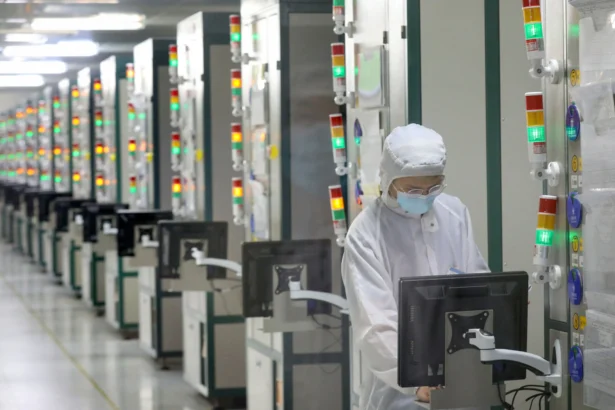American chipmaker ON Semiconductor Corporation (onsemi) is investing up to $2 billion to expand its factory in the Czech Republic.
Onsemi and the Czech government announced the new investment in its existing factory in the Czech town of Roznov pod Radhostem on Wednesday.
The investment is the biggest in the country since the split of Czechoslovakia in 1993.
Czech Prime Minister Petr Fiala said the investment would multiply the plant’s current output, which is 10 million chips per day.
The company, based in Scottsdale, Arizona, said the number of jobs created in Roznov will increase to 3,000 from the current 1,700.
Onsemi plans to build a silicon carbide manufacturing facility that would give greater efficiency to semiconductors, which are critical computer components.
“The expansion would also enhance our production of intelligent power semiconductors that are essential to helping ensure the European Union is able to achieve its ambitions to significantly reduce carbon emissions and environmental impact,” said onsemi president and CEO Hassane El-Khoury, in a press release.
Onsemi supplies chips that go into electric cars and help with driver-assistance systems like cameras and sensors. Its silicon carbide chips also help extend the range of electric vehicles.
The Czech Republic, home to Skoda Auto, which is now owned by Germany’s Volkswagen, sees the factory as a plus for its electric vehicle manufacturing. Volkswagen is the country’s biggest export company and is a strategic partner with onsemi.
“This investment not only strengthens our position in the semiconductor field but can also contribute to the development of the automotive industry and help us with its adaptation to the rise of electromobility,” said Jozef Síkela, the country’s trade minister.
Onsemi is “one of the only companies in the world” with the ability to manufacture semiconductors that use silicon carbide, according to the press release. Silicon carbide is a “critical material for high-power, high-temperature applications, and is extremely difficult to produce,” it says.
Silicon carbide chips are more expensive than standard silicon ones but are favored by automakers because they are energy-efficient, lightweight, and tough.
Supply Chain Concerns
Supply chain disruptions during the COVID-19 pandemic and a rise in trade tensions with China have heightened scrutiny of Europe’s reliance on Asia for chip supplies, with recent disruption to Red Sea shipping adding to concerns.

The head of onsemi’s power solutions division, Simon Keeton, said that production from the new investment could start in 2027.
“With this investment, the company would contribute to the strategic positioning of the region within the EU’s semiconductor value chain and demonstrate that all EU countries can benefit from the European Chips Act,” Onsemi said.
The Czech Industry and Trade Ministry said that state aid could reach up to 27.5 percent of the total investment. The incentive should be approved, including notification with the European Commission, in the first quarter of 2025, the ministry added.
The investment is within the company’s capital expenditure target and follows its announcement last week of about 1,000 job cuts among its 30,000-strong workforce.
Onsemi has been struggling with a sluggish recovery in demand for chips in the face of a weak electric vehicles market and excess inventory among its customers.
Semiconductor Demand
The onsemi investment in the Czech Republic comes as global semiconductor manufacturing is expected to become a trillion-dollar industry by 2030, expanding from $600 billion in 2021, consultancy firm McKinsey says.
The United States is forecast to increase its domestic chip manufacturing by 200 percent in 10 years, according to the Semiconductor Industry Association.
The investment also follows similar moves by STMicroelectronics—also for silicon carbide chips—in Italy and by Intel and TSMC in Germany.
Plans to build an STMicroelectronics plant in Catania will cost $5.4 billion and receive a direct government grant of about 2 billion euros.
Intel plans to spend 30 billion euros on two chip plants in Germany, with substantial government subsidies. Earlier, Germany pledged to contribute up to 5 billion euros to TSMC’s $11 billion factory in Dresden, German officials said last year.
Reuters and The Associated Press contributed to this report.
